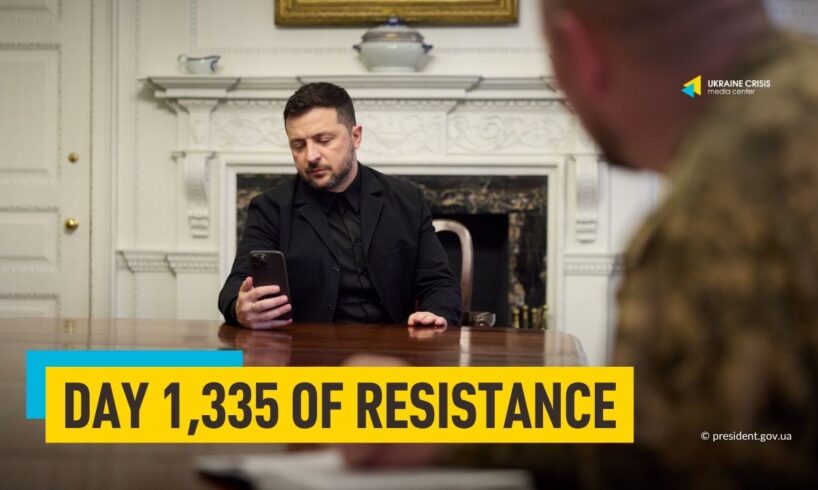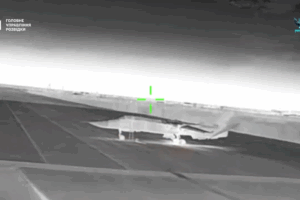
Ceding Donetsk region to Russia would reinforce its positions in future attacks on Ukraine, ISW says. Russia’s overnight attacks damage Ukraine’s railways and port infrastructure. The EU is to adopt a new package of sanctions against Russia on Thursday, Kallas says.
Ceding Donetsk region to Russia would reinforce its positions in future attacks on Ukraine, ISW says
Ceding Donetsk Oblast to Russia would set conditions for Russia to renew its aggression against Ukraine from more advantageous positions at a time of its choosing, the Institute for the Study of War (ISW) said in an update on Sunday. The four paragraphs below are quoted from the report.
Two senior officials told The Washington Post in an article published on October 18 that Putin told US President Trump on October 16 that Ukraine must cede the remainder of unoccupied Donetsk Oblast to Russia “as a condition for ending the war” and that he “would be willing to surrender parts” of occupied Zaporizhia and Kherson oblasts in exchange.
The exact terms of Putin’s reported offer are unclear. It is possible that Putin may have been referring to Ukrainian-controlled parts of Zaporizhia and Kherson oblasts that Russia illegally annexed and does not occupy. Putin previously demanded the remainder of Donetsk Oblast in exchange for a ceasefire in August 2025, and ISW has continuously assessed that ceding the remainder of Donetsk Oblast disproportionately favors Russia.
Donetsk Oblast contains territory that is strategically vital for Ukraine’s defense and defense industrial base (DIB), including the fortress belt [the cities of Kostyantynivka, Druzhkivka, Kramatorsk and Slovyansk, according to Ukrainian news site The New Voice of Ukraine] — Ukraine’s main defensive line in Donetsk Oblast since 2014, which Ukraine has developed into a significant logistical and defense industrial hub.
Russian forces currently have no available means of rapidly enveloping or penetrating the fortress belt, which would likely take several years to seize at their current rate of advance. Ceding Donetsk Oblast to Russia would allow Russian forces to avoid a long and bloody struggle and continue fighting into deep rear areas of Ukraine from new positions along the Donetsk Oblast border. Russian forces would have advantageous positions from which to launch attacks into eastern Dnipropetrovsk and Zaporizhia oblasts or southern Kharkiv Oblast – areas that are significantly less fortified than the fortress belt. Such a withdrawal would also set more advantageous conditions for the ongoing Russian offensive to advance across the Oskil River in eastern Kharkiv Oblast and approach Izyum. Russia would have its choice of multiple, mutually supportive offensive operations to undertake should Ukraine cede Donetsk Oblast to Russia, especially if there is no guarantee that Russia will not resume offensive operations in Ukraine.
U.S. President Donald Trump has denied telling his Ukrainian counterpart Volodymyr Zelenskyi he should surrender Ukraine’s entire Donbas region to Russia to end the war.
Asked by reporters on Sunday if he had told Zelenskyi that Ukraine must cede all of the Donbas region to Russia, Trump said no. “Let it be cut the way it is. It’s cut up right now. I think 78% of the land is already taken by Russia,” Trump said in response to a question from a Reuters reporter.
On Sunday, Zelenskyi told reporters in Kyiv: “The position of the Russians hasn’t changed. They want us to withdraw from Donbas — not the entire East, but specifically Donbas. That is, completely from the Donetsk and Luhansk regions.”
Zelenskyi also said he had explained to U.S. special envoy Steve Witkoff that some impressions the latter had about Ukraine’s eastern regions and its residents could be misleading.
“We understand that Mr. Witkoff is simply conveying what Russia means; this does not necessarily reflect his own view, at least according to him,” Zelenskyi said, according to the New York Post. “I made it clear to him that there are some misleading impressions.”
Zelenskyi said Witkoff had explained Russia’s position that Moscow sees Donetsk and Luhansk as its own after incorporating them into their constitution following an illegal annexation referendum in 2020.
“Mr. Witkoff points out that it was incorporated into their constitution,” Zelenskyi said. “So I explained to Mr. Witkoff once again that if tomorrow Putin adds something else to their constitution, after the war ends in one way or another, will we need to withdraw from some territory again? And if, for example, I amend the Constitution of Ukraine to include two regions of the Russian Federation, would they then leave those territories? This is a non-functional model,” Zelenskyi said.
“Putin works with the U.S., having big economic proposals and exploiting resources of a country that does not belong to him, but he uses it as if it were his private property,” Zelenskyi said. “Anyone who came into politics for a term stipulated by law, not for an amount of time defined by God, understands that you cannot sell or give away what does not belong to you. That’s how Russia’s approach is different from ours. No one is going to sell out Ukraine,” Zelenskyi said.
Trump said that he and Russian leader Vladimir Putin agreed during a lengthy phone call on October 16 to meet in Budapest. In a phone call with Trump Thursday, Putin demanded that Kyiv surrender full control of Donetsk as a condition for ending the war, two senior officials familiar with the conversation told the Washington Post.
Russia’s overnight attacks damage Ukraine’s railways, port infrastructure
Russia launched three Iskander-M/KN-23 ballistic missiles and 60 attack drones at Ukraine overnight on Monday, the Ukrainian Air Force said. The drones that included the Shaheds, Gerberas and other types of unmanned aerial systems were launched from the area of Russia’s Millerovo, Oryol, Primorsko-Akhtarsk and from Cape Chauda in occupied Crimea. The missiles were also fired from occupied Crimea.
The Air Force and other branches of the Ukrainian military deployed aircraft, surface-to-air missile troops, electronic warfare units and mobile teams to repel the attack.
Ukraine’s military said it shot down or otherwise neutralized 38 drones of the Shahed, Gerbera and other types in the north, south and east of the country. Three ballistic missiles and 20 drones hit target in 12 locations.
Russian attacks overnight on Monday targeted Ukraine’s logistical infrastructure, including railways and port facilities, Deputy Prime Minister for Restoration — Minister for Development of Communities and Territories of Ukraine, Oleksiy Kuleba said in a post to social media.
A traction power substation of Ukrainian Railways was damaged in Chernihiv region. The company’s energy workers began repairs almost immediately at night, but Russia sent more drones to target the same site, Kuleba said.
Thanks to a monitoring system the workers were taken to shelter in time, there were no injuries. Trains continue to move as reserve locomotives were deployed, he added.
Kuleba also said that Russia had attacked Ukraine’s port infrastructure, damaging a number of sites and buildings. The fires were quickly localized, while the port staff were in shelters and unharmed. Some of the ports are temporarily not accepting trains. The trains were diverted and will head toward the ports as soon as the circumstances permit, he said.
EU to adopt new package of sanctions against Russia Thursday, Kallas says
The EU High Representative for Foreign Affairs and Security Policy, Kaja Kallas said she expects that a 19th package of sanctions against Russia would be adopted this week.
“We are expecting this week, also, to adopt a 19th package of sanctions. Unfortunately, not today, but we have also a leaders’ meeting coming up on Thursday,” Kallas told reporters ahead of a gathering of European foreign ministers in Luxembourg on Monday.
“We see President Trump’s efforts to bring peace to Ukraine. Of course, all these efforts are welcomed, but we do not see Russia really wanting peace. Russia only understands strength and only negotiates when it is really put to negotiate. So, right now, we do not see it yet,” Kallas said in remarks.
According to Reuters, Austria said on Saturday that it would agree to the European Union’s latest sanctions package against Russia, in an about-face of its earlier stance and removing a key hurdle ahead of a vote early next week.
Reuters reported earlier this month the passage of the package was deadlocked because Austria was demanding that the EU unfreeze some Russian assets to compensate Austria’s Raiffeisen Bank International for penalties imposed by Russia. But other EU governments would not go along.
Adoption of the 19th package of sanctions is now only blocked by Slovakia. According to earlier reports, its leadership wants to discuss the measures at an EU leaders’ summit on Thursday.




